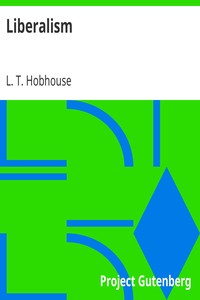Liberalism by L. T. Hobhouse
"Liberalism" by L. T. Hobhouse is an analytical treatise written in the early 20th century. This scholarly work examines the historical development and principles of liberal thought, emphasizing the transformation of societal structures in response to increasing demands for individual freedoms and rights. Hobhouse explores various dimensions of liberalism, including civil, fiscal, personal, social, economic, and political liberties, framing liberalism as a response to authoritarian social orders. The opening of "Liberalism" sets
the stage for a deep exploration of the evolution of political and social organization, tracing the historical struggle between authoritarian and liberal principles. Hobhouse draws comparisons between ancient and modern state systems, highlighting how societal ties such as kinship have historically been supplanted by the growth of larger, more cohesive civic entities. He introduces the idea that the modern state is a product of a civilizational evolution, shaped significantly by liberal ideas that advocate for personal freedom against oppressive structures. This foundational understanding paves the way for a discussion on the essential elements of liberalism and its historical implications, suggesting that the liberal movement is both a critique of the past and a pathway to future societal frameworks. (This is an automatically generated summary.)
Read or download for free
| How to read | Url | Size | |||
|---|---|---|---|---|---|
| Read now! | https://www.gutenberg.org/ebooks/28278.html.images | 340 kB | |||
| EPUB3 (E-readers incl. Send-to-Kindle) | https://www.gutenberg.org/ebooks/28278.epub3.images | 187 kB | |||
| EPUB (older E-readers) | https://www.gutenberg.org/ebooks/28278.epub.images | 190 kB | |||
| Kindle | https://www.gutenberg.org/ebooks/28278.kf8.images | 328 kB | |||
| older Kindles | https://www.gutenberg.org/ebooks/28278.kindle.images | 293 kB | |||
| Plain Text UTF-8 | https://www.gutenberg.org/ebooks/28278.txt.utf-8 | 303 kB | |||
| Download HTML (zip) | https://www.gutenberg.org/cache/epub/28278/pg28278-h.zip | 175 kB | |||
| There may be more files related to this item. | |||||
Similar Books
About this eBook
| Author | Hobhouse, L. T. (Leonard Trelawny), 1864-1929 |
|---|---|
| Title | Liberalism |
| Series Title | Home University Library of Modern Knowledge |
| Note | Reading ease score: 54.8 (10th to 12th grade). Somewhat difficult to read. |
| Credits |
Produced by Steven Gibbs, Martin Pettit and the Online Distributed Proofreading Team at http://www.pgdp.net |
| Language | English |
| LoC Class | HM: Social sciences: Sociology |
| Subject | Liberalism -- Great Britain |
| Subject | Great Britain -- Politics and government -- 1837-1901 |
| Category | Text |
| EBook-No. | 28278 |
| Release Date | Mar 8, 2009 |
| Copyright Status | Public domain in the USA. |
| Downloads | 185 downloads in the last 30 days. |
| Project Gutenberg eBooks are always free! | |

